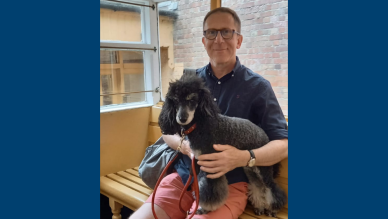Retired nurse and crime writer, Chris Bridges, tells us how he constantly adapts his lifestyle to manage his MS.
I saw a psychologist recently. Everyone should. We’re all a bit messed up, aren’t we? This one was a specialist health psychologist who works with people with neurological disorders.
After about four sessions she said something that stuck with me. Firstly, that I was resourceful (I liked that) and secondly that my lifestyle adapts well to chronic illness.
Fair enough. I have always followed the maxims of 'never stand up when you can sit down,' and 'never sit down when you can lie down'.
Even in the vigour of youth I was most likely to be found in a darkened room, reading a thriller. If someone suggested a jolly game of rounders on the park then I was the one on the sidelines, rolling my eyes like a silent film star.
I’m not a natural athlete and have always believed that endorphins through exercise are a wicked myth.
Inside has less bitey insects, more comfortable furniture and an easier to control ambient temperature. There are books in reach, a soft sofa and the ability to shut out the world.
Quentin Crisp famously said, ‘You see, the fact is when I was young all I really wanted of course was to be a chronic invalid, because then I would have been able to live at home forever.’ I certainly didn’t want to stay at home.
I was ready to live on my own at twelve. I’ve also never aspired to being chronically ill but have to admit that wilting on a chaise longue has always felt like a worthy career goal.
Afternoons can be such a chore while early mornings and late nights are much more invigorating.
Ultimately, regardless of what I do and don’t like doing, what my lifestyle and career aims are/were: I have to accept what I have. To an extent. I don’t have to like it. I can and do rail against it.
I can be angry and sad (and often am). But ultimately, I adapt. I read more, watch more films on TV, listen to more radio plays. I see less plays at the theatre, I walk when I can and rest when I must.
I write fiction, even if I only have the energy to write for thirty minutes a day. I also have days off.
Since my diagnosis of MS in 2020, I’m getting better at being ill and better at managing the times I feel well.
The only problem is that the disease isn’t always static. But then neither am I.
My mutability will out.



